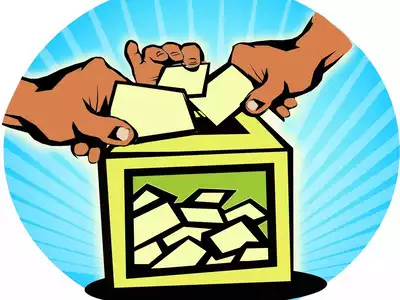Context-
Rajya Sabha elections in India hold immense significance as they shape the composition of one of the country's key legislative bodies. However, recent instances of cross-voting, notably in states like Uttar Pradesh, Himachal Pradesh, and Karnataka, have sparked debates regarding the integrity of the electoral process.
How could cross-voting play out?
For example, in the forthcoming Rajya Sabha polls in UP, 10 seats are vacant. The state has 399 MLAs at the moment. As per the proportional representation system, each candidate in UP requires at least 37 votes to win.
The BJP has 252 MLAs and its NDA allies account for 34 MLAs – 13 from the Apna Dal, nine from the Rashtriya Lok Dal (RLD), six each from the NISHAD Party and the Suheldev Bharatiya Samaj Party (SBSP). The Jansatta Dal Loktantrik, which has two MLAs, is also expected to vote in favour of the BJP.
If the BJP manages to get all these 36 votes from its allies, in addition to its own votes, its total number of votes will reach 288. However, the BJP has fielded eight candidates, meaning the party will now need 296 votes (37 multiplied by 8). The BJP will fall short hence by eight votes, setting the stage for cross-voting, potentially by SP members, who want to elect 3 MPs of its own.
How Rajya Sabha Elections are Held:
Article 80 of the Constitution stipulates that representatives to the Rajya Sabha from each state are elected indirectly by members of their respective Legislative Assemblies. Historically, these elections often resulted in uncontested victories until the June 1998 Rajya Sabha elections in Maharashtra, which witnessed cross-voting, challenging the traditional norms. To address such issues, an amendment to the Representation of the People Act, 1951, introduced an open ballot system in 2003 for Rajya Sabha elections.
The Role of the Tenth Schedule:
The Tenth Schedule, introduced by the 52nd constitutional amendment in 1985, addresses anti-defection measures. It mandates the disqualification of members of Parliament or State legislatures who defect from their party's instructions or voluntarily relinquish party membership. However, the applicability of the Tenth Schedule to Rajya Sabha elections has been a matter of contention. The Election Commission clarified in 2017 that Tenth Schedule provisions regarding party instructions do not apply to Rajya Sabha elections.
Judicial Interpretations and Court Rulings:
Several landmark court cases have shaped the legal landscape surrounding Rajya Sabha elections and cross-voting. In Kuldip Nayar versus Union of India (2006), the Supreme Court upheld the open ballot system, emphasizing transparency as a means to combat corruption. However, the court ruled that voting against one's party in a Rajya Sabha election does not necessarily warrant disqualification under the Tenth Schedule. Subsequent cases, such as Ravi S. Naik and Sanjay Bandekar versus Union of India (1994), have further elucidated the definition of 'voluntarily giving up membership.'
Instances of Cross-Voting and Disqualification:
In the recent Himachal Pradesh Rajya Sabha elections, six Congress MLAs were disqualified under the Tenth Schedule for cross-voting and defying party directives during the passage of the Budget in the Assembly. Such instances underscore the challenges in maintaining party discipline and electoral integrity in the face of cross-voting practices.
What was the solution proposed?
In its first report in December 1998, the committee observed that money and muscle power played an increasing role in Rajya Sabha elections, suggesting: “In order not to allow big money and other considerations to play mischief… the Committee is of the view that instead of a secret ballot, the question of holding the elections to the Rajya Sabha and the Legislative Councils in states by open ballot may be examined.”
In 2001, then law minister Arun Jaitley introduced a Bill, bringing an amendment to the Representation of the People Act so that the Rajya Sabha polls could be held by open ballot. Since then, leaders who cross-vote in the Rajya Sabha polls can be expelled by their party.
The Way Forward:
In India, we follow a two-fold principle. When it comes to voting in direct elections where the entire population is involved, we insist on a secret ballot. But in legislative chambers, where Bills are to be voted on, we do not insist on secrecy. The voting is open. The Rajya Sabha election fell halfway between the two kinds of votes. It elected MPs but the electoral college was not based on universal franchise: only MLAs could vote. It was decided that voting for Rajya Sabha candidates had more in common with voting on Bills than with general elections. So, the secret ballot was abolished and voting became public. Instances of cross-voting have undermined the higher principle of free and fair elections and their purity.
The judiciary, recognizing the gravity of the situation, may intervene through suo moto Public Interest Litigation or appellate review of disqualification orders. Strengthening the legal framework and enforcing stringent penalties for cross-voting could serve as deterrents against such electoral malpractices.
Conclusion:
Rajya Sabha elections stand as a cornerstone of India's parliamentary democracy, reflecting the collective will of the states' legislative assemblies. However, the specter of cross-voting looms large, challenging the integrity of the electoral process. While legal provisions such as the Tenth Schedule and judicial rulings provide frameworks for addressing defection and cross-voting, their efficacy in practice remains debatable. As India navigates the complexities of electoral politics, ensuring transparency, accountability, and adherence to democratic principles is paramount. Only through concerted efforts by stakeholders across the political spectrum can the sanctity of Rajya Sabha elections be preserved, safeguarding the foundational principles of Indian democracy.
|
Probable Questions For UPSC Mains Exam-
|
Source- The Hindu







